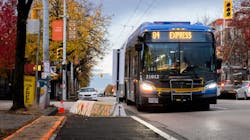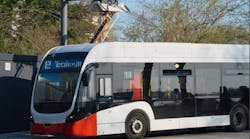TransLink has released its latest Bus Speed and Reliability Report. The report shows bus delays due to traffic congestion have returned to pre-pandemic levels, underscoring the need for bus infrastructure investments as laid out in TransLink’s 10-Year Priorities.
The report found bus delays cost Coast Mountain Bus Company $80 million per year, equating to around 15 percent of the company’s operating costs. However, the report suggests these are solvable problems, with investment in expansion the key to improving bus performance in the region.
Buses operate faster when protected from traffic via bus priority measures such as those funded by TransLink’s Bus Speed & Reliability Program. These investments complement the service expansions and future RapidBus and Bus Rapid Transit corridors identified in TransLink’s 10-Year Priorities.
“Every day, customers rely on buses to get them to the places that matter most, from work and school to healthcare appointments and everywhere in between,” says TransLink CEO Kevin Quinn. “With congestion returning to our roads, it’s more important than ever we prioritize bus service, continue to invest in transit and meet the needs of our growing region."
Between February 2020 and April 2020, during COVID-19 pandemic lockdowns, general-purpose traffic fell significantly, resulting in direct improvement on bus performance. TransLink observed, on average, a 14 percent increase in system-wide speed, with some routes recording 20 percent increases.
Among the region’s most congested corridors, bus passengers can represent up to 60 percent of road users. TransLink has identified 20 “Profile Areas” of delay to analyze and improve bus performance.
A second section of the report detailing “Bus Priority Infrastructure”, focusing on reducing delays, will be released later this year, followed by a third section identifying areas of opportunity for bus priority measures.




